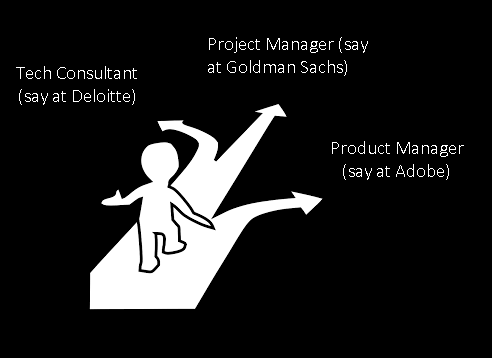Can An Executive MBA Get You A Product Management Job?
Do you believe that an Executive or Part-time MBA from a renowned institute will help you pivot into a product management role? Extract the answer from my IIMB PGPEM program experience.

This article is inspired from a column which I published on IIMB Blog on January 8, 2019.
I am a student of the 2017-19 batch of the Post Graduate Programme in Enterprise Management (PGPEM) at IIM Bangalore. The PGPEM is a program designed for working mid-level and senior executives. Like most of the PGPEM aspirants, I joined the program to keep the career plateau at bay. I perceived that IIMB is a big brand and creating a career pivot based on an IIMB education would be smooth sailing. Although I did not know the destination (my next career move), I was confident that I would figure that out during the two-year journey at IIMB. At the time of joining the PGPEM, I had a Bachelor of Technology degree along with 10 years of work experience mostly in investment banking technology.

From the career options I had, I chose the product management role. Why? With the digital boom in India, a product management job has become a hot trend. The role is exciting, and its future in the software industry has huge potential.
I have achieved my goal during the ending months of the program. It took almost eight months to receive an offer letter after facing rejection in multiple applications. I am jotting down a list of my learning from my experience of cracking Product Manager (PM) interviews as a PGPEM student.
- IIMB tag: I assumed that completing a program from IIMB would help me get a foot in the door. It did in some cases. However, the all-important message is to have your resume tell the story of a PM when you apply to companies.
- Storytelling: Can you tell stories in interviews about your work and more importantly, about things beyond work? I found this an extremely vital skill to develop.
- Prep, Prep, Prep: Prep matters, probably the first parameter of gaining confidence for PM interviews as PGPEM study material might not break the glass for you.
- Partnership with batch mates: Are you prepping alone or have company to share ideas? Trust me – PM interviews are extremely creative ones. The more you share knowledge, the chances are better that you will not be surprised by questions thrown at you.
- PM Network: Do you have a strong PM network? A product/feature has probably 20-30 developers but just one PM. What are the chances of getting an interview call when there are thousands of applicants? Do you know people who can get you a call for an opening?
- Aspiring role: The PM role varies from company to company. Therefore, your prep must be customized as per company requirements once you get an interview call. For example, in B2C products, you have to look for data (metrics, analytics) to shape consumer behavior. If you become a Platform PM, then the role would demand you to make the best use of derivatives by creating a platform. Thus, in this case, managing internal stakeholders and road mapping will be the prime skills.
- Data is everything: The PM role is metrics driven. If you cannot talk about metrics intuitively then you are not ready to take up interviews.
- Interview Feedback: It is okay to be rejected by companies if you just started your journey of attending interviews. I was rejected ‘n’ number of times where 7<n<10. Remember that each rejection will give you valuable data to take your prep to the next level.
- Joining start-ups: Are you sure that you want to go to a start-up? A significant insight I got is that a start-up CEO is the product head. Therefore, is it possible for a PM to drive product strategy or would the CEO keep it to himself and the PM be just an executor?
- Thinking on your feet: The range of questions you would be asked during PM interviews is not confined to a few specifics. From creating an HR policy to designing a product, I was asked almost everything. Moreover, PM interviews are taken by leadership teams (UX Manager, Product Director, CEO, Engineering Manager, etc.). Thus, be prepared for any random out-of-the-box question.
In conclusion, I must say that if you sit idle during the program assuming that an Executive MBA from a renowned B-school will open every door for you then you are shooting yourself in the foot. A decade ago, a degree could have earned you a job, however, it is not the case today. Today, every employer's mantra is "Skills, not degrees". Leverage the degree to build credibility but prove to employers that you are more than the certified documentation.
